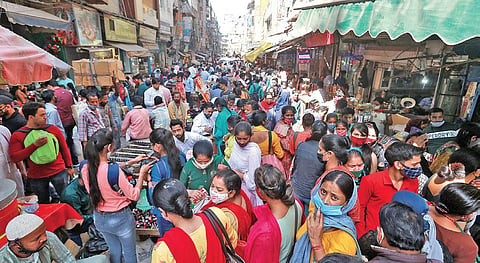

NEW DELHI: With 3,594 fresh cases of coronavirus, the national capital on Friday once again recorded the highest single day spike this year. Within 24 hours, the city saw an addition of more than 800 positive cases. Last time the city saw closest to Friday’s figure was on December 4 when the city recorded 4,067 infections.
Delhi Chief Minister Arvind Kejriwal while addressing a digital press conference said that the state which is witnessing the fourth wave of Corona, is less serious than the previous ones. He added that mortality rates are comparatively low and people being admitted into hospitals and ICU is relatively low as well. However, the figures of Covid surge don’t indicate that the situation is ‘less serious’. From as low as only 175 cases on March 1, Delhi within a month reached to 3K plus figure.
Last month, the city registered more than 25,000 cases. There has been a steady rise in the number of active cases as well — from only 1,404 in the beginning of March, the active cases have gone up to 11,994 on April 2, as per the daily health bulletin provided by state government.
Supporting Kejriwal’s statement of not imposing lockdown in the state, Dr Lalit Kant former Scientist ‘G’ and Head (Epidemiology and. Communicable Diseases Division), ICMR noted that such measures are not a solution to curb virus spread.
“New strains start to circulate fast. If the state doesn’t take precautionary measures, the situation is most likely to again slip out of hands. People attending marriage ceremonies or public functions need to be cut down. The eateries should allow limited visitors. Also we need to focus on the disease dynamics and human behaviour. Since we know what has happened in other countries and are aware of our resources which is an advantage. We can manage again,” added Dr Kant.
“There is a possibility that a high number of cases happen if enough precautions are not taken and it may be five times faster in terms of rise. The virus will remain for long and continue to infect. Study on spread of variants will help to find out the pattern of virus distribution,” said Dr Jugal Kishore, head, Community Medicine at Safdarjung Hospital.